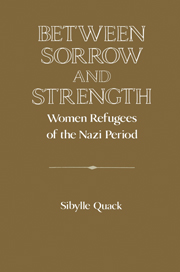Book contents
- Frontmatter
- Introduction
- Prologue: Jewish Women in Nazi Germany Before Emigration
- Part One A Global Search for Refuge
- 1 Jewish Women Exiled in France After 1933
- 2 Arrival at Camp de Gurs: An Eyewitness Report
- 3 Women Emigrés in England
- 4 England: An Eyewitness Report
- 5 Women Emigrés in Palestine: An Eyewitness Report
- 6 “Naturally, many things were strange but I could adapt”: Women Emigrés in the Netherlands
- 7 Refugee Women from Czechoslovakia in Canada: An Eyewitness Report
- 8 Women in the Shanghai Jewish Refugee Community
- 9 Shanghai: An Eyewitness Report
- 10 German-Jewish Women in Brazil: Autobiography as Cultural History
- 11 A Year in the Brazilian Interior: An Eyewitness Report
- Part Two Refuge in the United States
- Epilogue: The First Sex
- Index
7 - Refugee Women from Czechoslovakia in Canada: An Eyewitness Report
Published online by Cambridge University Press: 05 January 2013
- Frontmatter
- Introduction
- Prologue: Jewish Women in Nazi Germany Before Emigration
- Part One A Global Search for Refuge
- 1 Jewish Women Exiled in France After 1933
- 2 Arrival at Camp de Gurs: An Eyewitness Report
- 3 Women Emigrés in England
- 4 England: An Eyewitness Report
- 5 Women Emigrés in Palestine: An Eyewitness Report
- 6 “Naturally, many things were strange but I could adapt”: Women Emigrés in the Netherlands
- 7 Refugee Women from Czechoslovakia in Canada: An Eyewitness Report
- 8 Women in the Shanghai Jewish Refugee Community
- 9 Shanghai: An Eyewitness Report
- 10 German-Jewish Women in Brazil: Autobiography as Cultural History
- 11 A Year in the Brazilian Interior: An Eyewitness Report
- Part Two Refuge in the United States
- Epilogue: The First Sex
- Index
Summary
“Wilma Iggers was born in Mirfkov, Czechoslovakia, in 1921. In 1938 she emigrated with her family to Canada, where she received her B.A. in French and German from McMaster University, Hamilton, Ontario. She received her M.A. and her Ph.D. in Germanic languages and literature from the University of Chicago. She conducted postdoctoral research in Göttingen and has received fellowship assistance for research in the United States, both postwar Germanies, and Czechoslovakia. She has taught at universities throughout the United States and has been a professor at Canisius College since 1915. The author of Die Juden in Bödhmen und Mähren (1986), she has also published and lectured widely in the field of comparative literature. Married in 1948, she has three children. This report was composed in 1991.
In the fall of 1938, we emigrated to Canada and settled on farms near Hamilton, Ontario. I am offering this story of the immigration from farms in Czechoslovakia to farms in Canada as a corrective: first, to the general notion that Central European Jews were anything but farmers, and second, to the notion prevalent in the publications of the Leo Baeck Institute, that they tended to be Grossbürger (upper middle class). My father was the leader of a group of thirty-nine people, mostly relatives, who were Jews and farmers in western Bohemia. Farmers were the largest category of immigrants to Canada. We suspected, and our suspicions were confirmed by the well-documented book, None Is Too Many: Canada and the Jews of Europe, by Irving M. Abella and Harold Troper, that the Canadian immigration authorities had hoped to avoid taking in Jews. It does not seem to have occurred to them that there were Jewish farmers.
- Type
- Chapter
- Information
- Between Sorrow and StrengthWomen Refugees of the Nazi Period, pp. 121 - 128Publisher: Cambridge University PressPrint publication year: 1995
- 1
- Cited by

